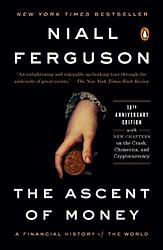The Ascent of Money: A Financial History of the World by Niall Ferguson
This book provides a comprehensive history of money, credit, and banking, tracing their evolution from ancient times to the present. It explores how financial systems have shaped human history, from the rise and fall of empires to the development of modern economies. The book delves into the origins of the stock market, the true nature of insurance, the perils of inflation, the importance of property rights, and the role of financial innovation in economic growth. It also examines the causes and consequences of financial crises, offering valuable insights into the complex relationship between finance and society.
The 10428th greatest book of all time
Ranking Details:
Our ranking system awards points to books based on their appearance and position on curated lists. Here's how it works:
Unranked Lists: For lists without specific rankings, each book receives points equivalent to the list's weight. This approach recognizes the book's inclusion on prestigious lists.
Ranked Lists: Books on ranked lists receive points in two ways:
- Base Points: Initially, every book is awarded points equal to the list's weight, acknowledging its significance.
- Bonus Points: Additionally, books earn bonus points based on their ranking. The total bonus pool, equal to 100% of the list's weight, is distributed among the books, with higher-ranked books receiving more points.
Exponential Distribution: The distribution of bonus points follows an exponential model. This means the top-ranked book (#1) receives significantly more bonus points than those further down the list (e.g., #100). Our algorithm ensures that higher placements are rewarded more generously, reflecting the achievement of a top rank on any given list.
This scoring system ensures that each book's ranking reflects both its presence on multiple lists and its positions within those lists, providing a comprehensive measure of its acclaim and popularity.
Total Points: 9
Since this book was first published in 2008, there is a penalty of 54.4%. The age adjusted score is 4.1.
This is to prevent newer books from reaching super high on the ranked list of the greatest books of all time. The greatest books should also stand the test of time.
- score: 9 -- The 100 Best Books of the Decade(2000) (Weight: 9)

